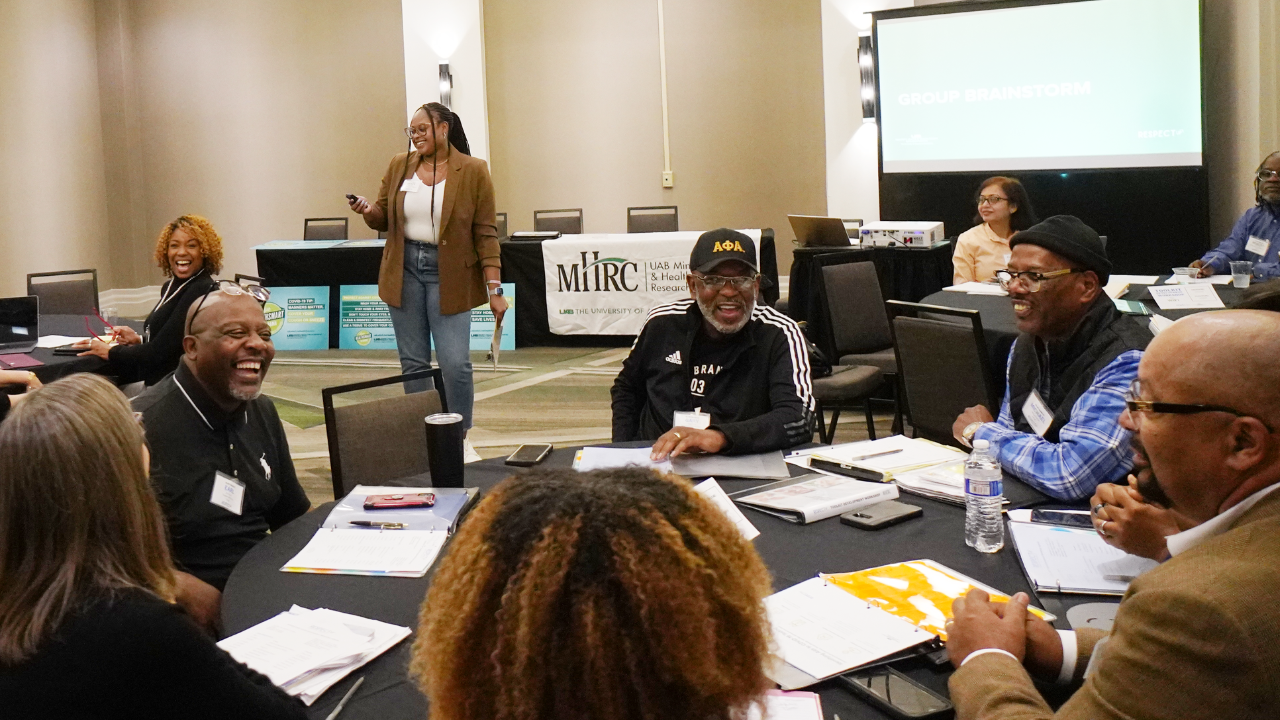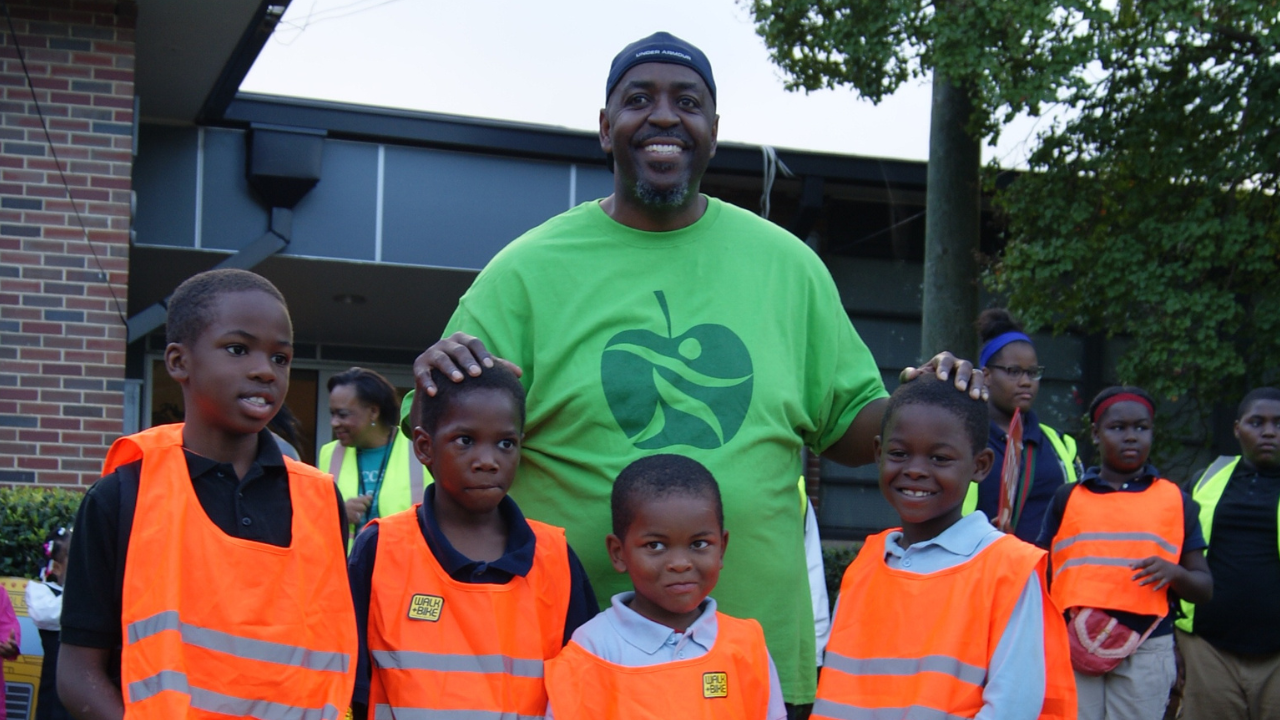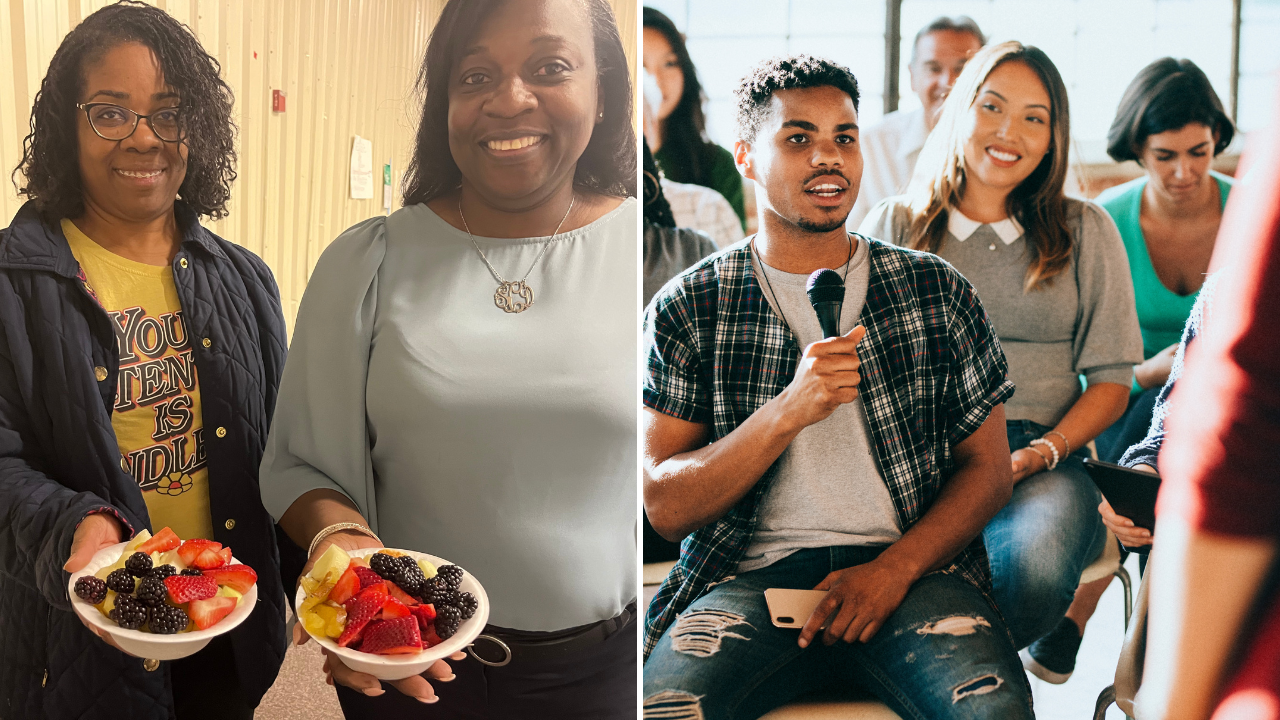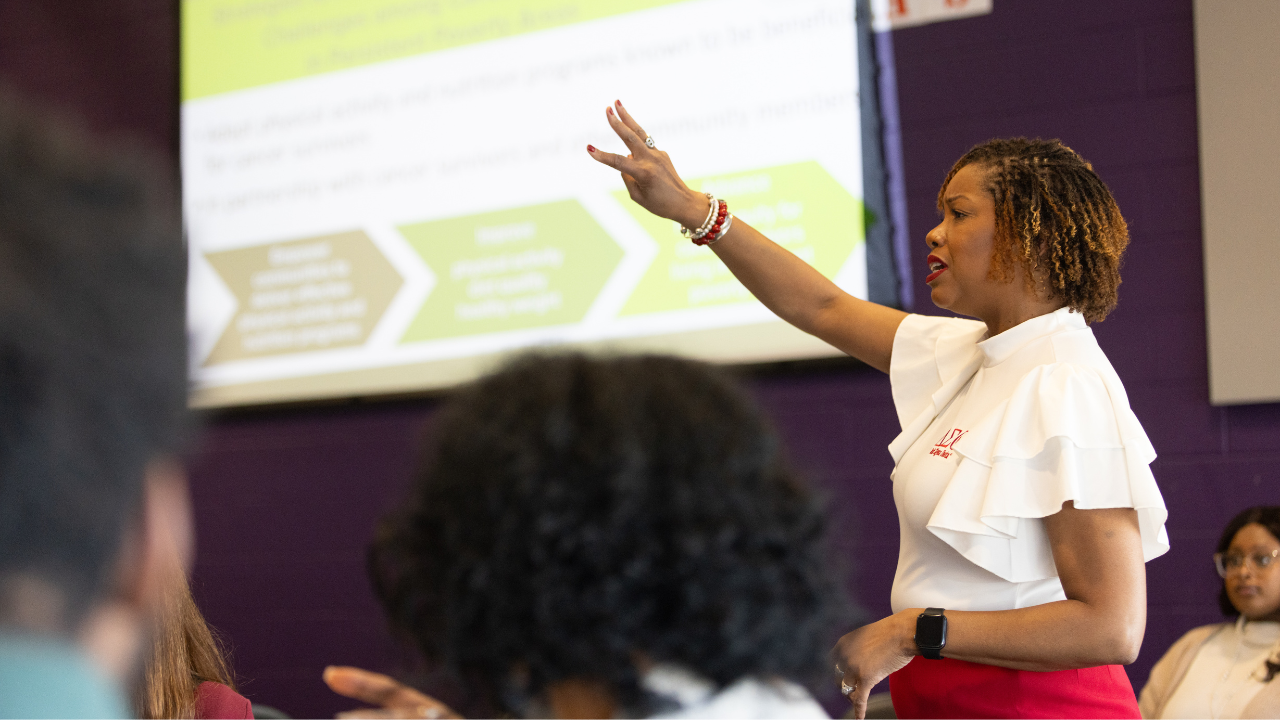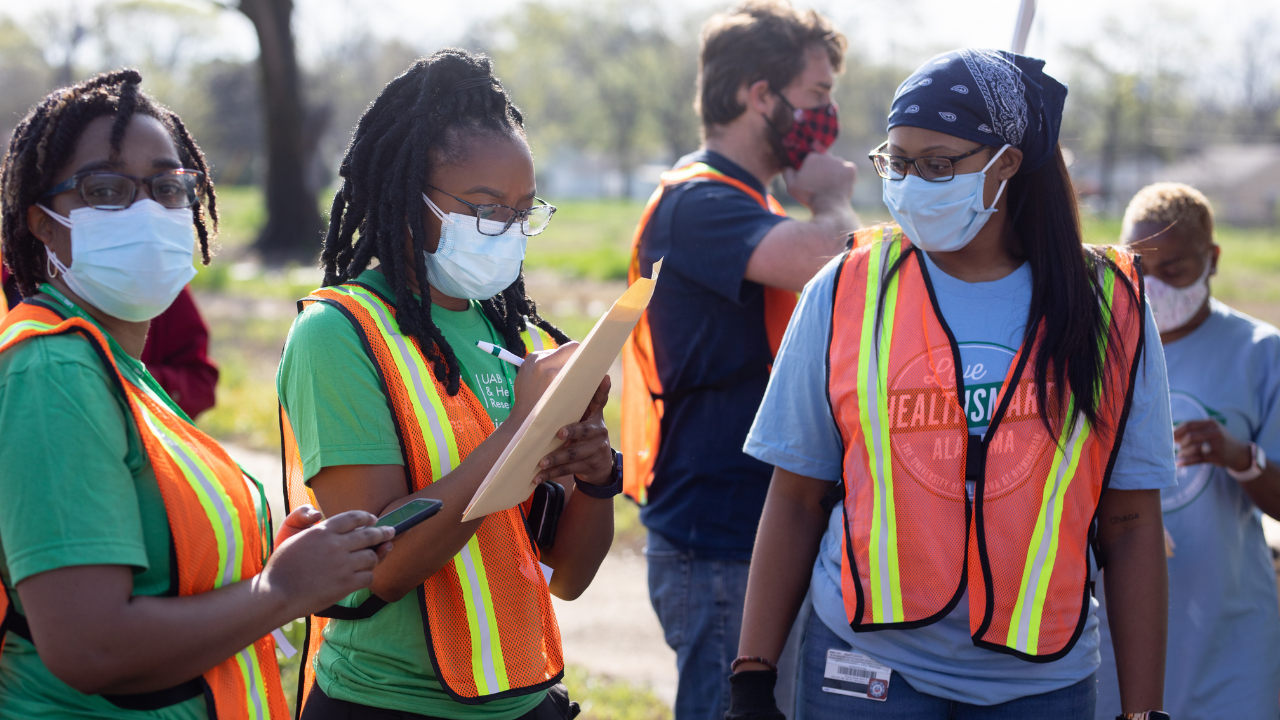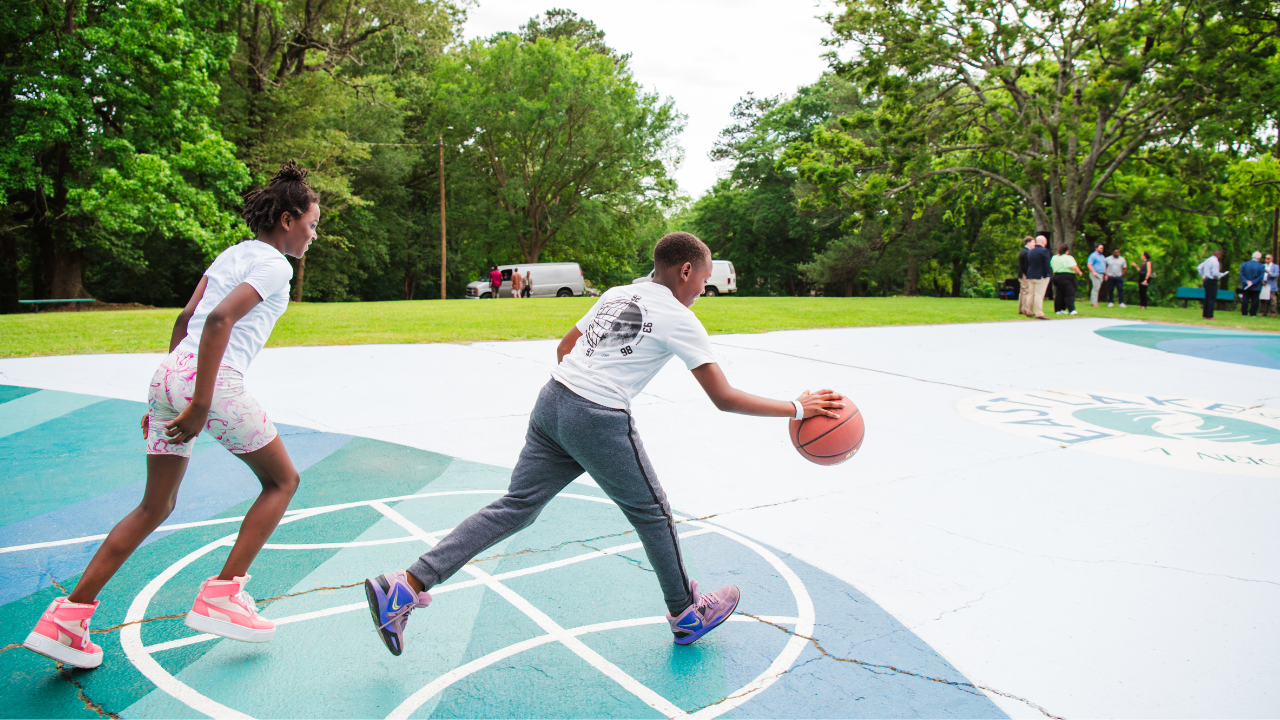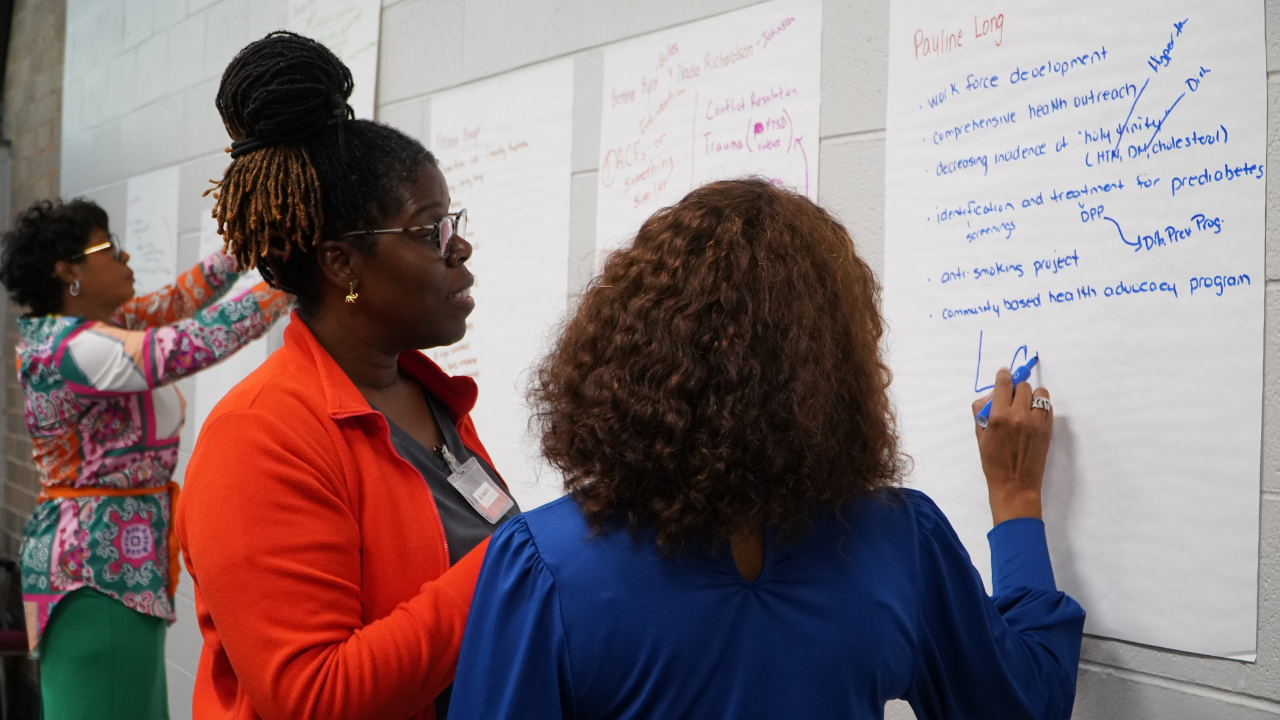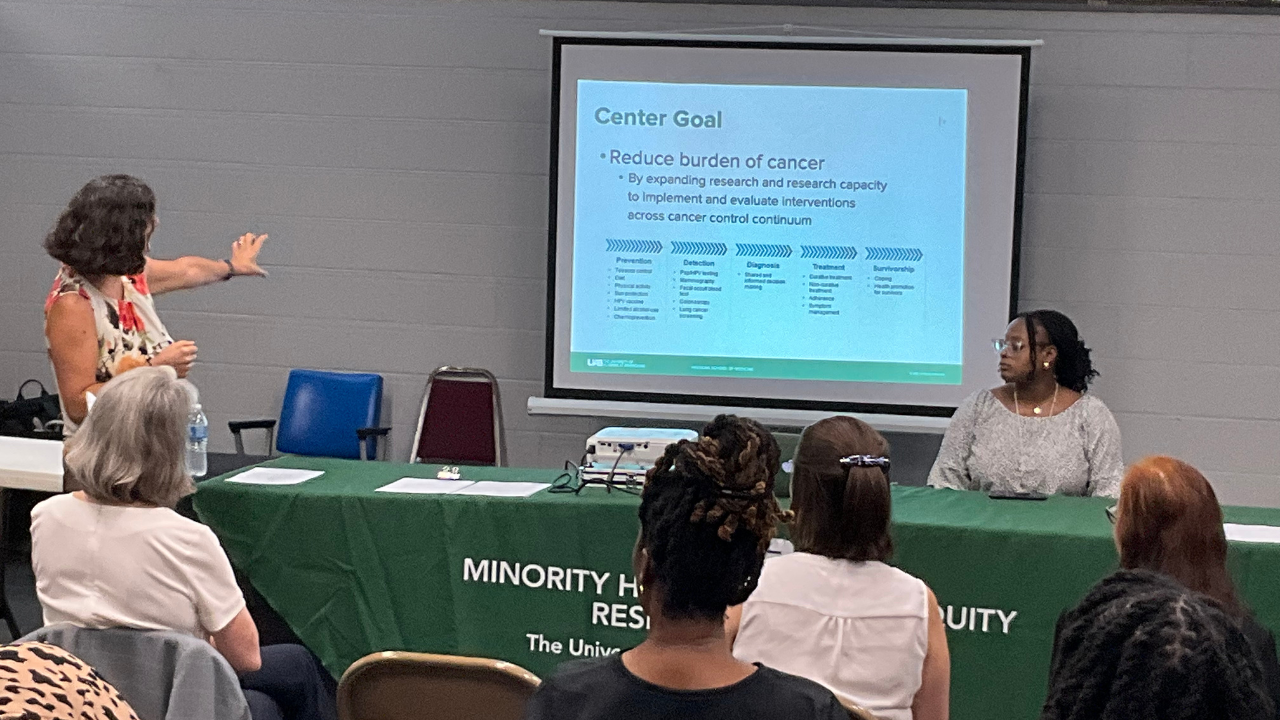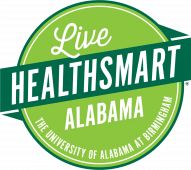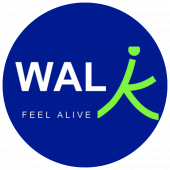| Community Engagement Services | | Current Initiatives | | Community-Engaged Research | | Past Research |
The Minority Health & Health Equity Research Center’s (MHERC) Community Engagement Program is dedicated to developing and sustaining trusting, mutually beneficial academic-community relationships to support research and interventions that improve community health.
No one understands a community better than the people who live, learn, and work there. MHERC Community Engagement strives to ensure that the voice of the community is present in research, interventions, and projects designed to address health equity. To that end, the Community Engagement Team has cultivated and maintained nearly 200 partnerships or collaborations with groups and organizations. Built on a foundation of trust, these relationships thrive having the MHERC in the community, working alongside residents all over the state of Alabama.
Community Engagement Services
- Link researchers with community and academic partners
- Establish and facilitate community coalitions
- Convene and manage community advisory boards
- Assist researchers with community-based grant implementation
- Offer community service-learning opportunities to UAB students
Current Initiatives
Our Center, Community Engagement team, and partners are making a difference in the health of our communities. Click one of our initiatives below to learn more.
Community-Engaged Research
Past Research
-
The Community Connection
Linking Researchers and Communities
In clinical trials, a precisely selected research population is as crucial a resource as any high-tech research equipment. The MHERC works with the Recruitment and Retention Shared Facility (RRSF) to identify potential participants in UAB clinical trials.
-
Diabetes Research Center
-
Deep South Network for Cancer Control
"Cancer rates in minority and under-served populations in the South are among the nation’s highest. For more than 10 years, the Deep South Network has targeted two poor, rural regions — Alabama’s Black Belt and the Mississippi Delta — and the urban areas in Jefferson County, Ala., and the Hattiesburg/Laurel, Miss., metropolitan area. The network has trained more than 1,000 volunteer Community Health Advisors as Research Partners to educate family and friends about the importance of prevention and early detection of cancer."
-
Teen Health
Adolescent years are critically important for so many reasons, not the least of which is that teenagers often make lifestyle choices that place their health – and future health – at serious risk. Young adults confront health and safety issues and they struggle to adopt healthy behaviors. Studies show that feeling connected to school – believing that adults and peers care about them – offers teens extra protection against the challenges they face. Young people who feel these positive connections are less likely to engage in risky behaviors; they are also more likely to do better in their classes.
The MHRC Teen Program builds on the idea of connectedness by teaching Birmingham-area teens how to encourage their fellow students to make smart lifestyle choices. The program trains high school seniors to serve as Community Health Advisors (CHAs). The teen CHAs learn about peer support, nutrition, physical activity, and prevention of violence, substance abuse, sexually transmitted diseases, and teen pregnancy. They reach out to other high school students, delivering important health messages through Health Talking Circles, Health Clubs and Fitness Teams, which are offered as extracurricular activities for 9th-12th grade students.
Teens may not listen to their parents, but they will listen to each other; the most important advice can come from their friends. The Teen Program develops young peer volunteers into leaders who will help guide their classmates towards healthy behaviors.
-
Promotores de Salud
Sowing the Seeds of Health:
A Lay Health Promoter Program for the Latino CommunityPrincipal Investigator: Isabel C. Scarinci, PhD, MPH
Program Director: Allison A. McGuire, MPH
Peer Health Educators: Pilar Rincon, Catherine Cartagena
Program Coordinators: Maria Isabel Hoyos-Hernandez, Sylvia L. PeralFunded by: Susan G. Komen North Central Alabama, National Cancer Institute
Sowing the Seeds of Health (Sembrando las Semillas de la Salud) is a community-based educational program conducted by the University of Alabama at Birmingham (UAB), Division of Preventive Medicine. The program educates lay individuals from the Latino community with the knowledge and skills necessary to promote health and connect individuals to affordable health care. The overall goal of the program is to reduce incidence of breast and cervical cancer in Latina immigrants via community health advisors or “promotoras de salud.”
Sowing the Seeds of Health is based on the following foundation: (a) extensive formative assessment through which members of the target audience were involved in all steps of program development, making it culturally-relevant; (b) true collaboration between organizations by bringing together resources and expertise; (c) it is manualized; (d) it is theory-based; and (e) it has strong process and outcome evaluation components.
The program is implemented by identifying and recruiting natural helpers (volunteers) in the Latino community. These natural helpers are then trained on health topics (breast and cervical cancer, family planning, sexually transmitted infections, healthcare access) and skills (communication, problem solving, stages of change, public speaking, etc.) through a series of 8 sessions. The empowerment model is used in the training to encourage the promoters to take responsibility for their own health, as well as facilitating a responsibility among other Latinas. These trained “promotoras” then educate and disseminate health information to other Latinas in the community via events and activities. Churches have been chosen (regardless of denomination) as the mechanism for recruitment and dissemination of information based on the results of the extensive needs assessment, which indicated that Latino immigrants tend to trust these organizations.
For ten consecutive years, in collaboration with Susan G. Komen North Central Alabama, the promoters have conducted yearly luncheons in local churches where a Spanish-speaking physician provides education on breast and cervical cancer early detection and screening and participants are given the opportunity to obtain appointments for low-cost clinical breast exams (CBE) and Pap smears at local clinics. Latina immigrants 40 years of age and older are offered appointments for low-cost mammograms at local hospitals. Over 2,000 women have been screened through these educational luncheons.
The program is currently being implemented in rural counties within the state of Alabama that contain high percentages of Latinos. Promoters have been trained and yearly breast and cervical cancer screening events occur in the following counties: Jefferson, Shelby, Limestone, Madison, Marshall, and Tuscaloosa.
As part of the Sowing the Seeds of Health program, we also created an informative DVD for health care providers that frequently see Latino patients. The DVD covers topics such as cultural competence in healthcare for Latinos, expectations of Latino patients seeking care, and common culture beliefs and practices of Latino immigrants. The goal of the DVD is to help health care professionals better understand their Latino patients, thus facilitating a more positive experience for both the providers and the patients.
References:
White, K., Garces, I., Bandura, L., McGuire, A., Scarinci, I.C. (2012) Design and evaluation of a theory-based, culturally relevant outreach model for breast and cervical cancer screening for Latina immigrants. Ethnicity and Disease, 22(3):274-80. PMC3762980.
McGuire, A. A., Garces-Palacio, I. C., Scarinci, I. C. (2012) A Successful Guide in Understanding Latino Immigrant Patients: An Aid for Health Care Professionals. Family & Community Health, 35(1):76-84. -
Birmingham REACH for Better Health
Principal Investigator: Mona N. Fouad, MD, MPH (UAB)
Co-Principal Investigator: Mark E. Wilson, MD (Jefferson County Health Department)
Investigator: Monica L. Baskin, PhD (UAB)
Evaluator: Bisakha Sen, PhD (UAB)
Program Director: Theresa A. Wallace, PhD (UAB)Core Partners:
- Freshwater Land Trust
- Jefferson County Health Department
- REV Birmingham
- Safe Routes to School
- YMCA
Funded by: The Centers for Disease Control and Prevention (CDC)
The University of Alabama at Birmingham (UAB) Minority Health and Health Disparities Research Center (MHRC) won a competitive grant of nearly $3 million from the Centers for Disease Control and Prevention (CDC) to reduce the gap in chronic diseases between African Americans and Whites in Birmingham by improving nutrition and physical activity in underserved African American communities. The award is part of a U.S. Department of Health and Human Services (HHS) initiative to support public health efforts to reduce chronic diseases, promote healthier lifestyles, reduce health disparities, and control health-care spending.
The project, "Birmingham REACH for Better Health," is a partnership between UAB, the Jefferson County Department of Health, United Way of Central Alabama, Freshwater Land Trust, Birmingham YMCA, REV Birmingham, and Safe Routes to School. The project will last three years and will reach more than 116,000 people.
“Substandard nutrition and lack of physical activity are key factors driving the disparities in chronic disease between African Americans and Whites,” said Dr. Mona Fouad, the Principal Investigator of this new initiative and the Director of the UAB MHRC and the UAB Division of Preventive Medicine. “One of the most efficient ways to improve population health and cut down health-care cost is to ensure access to healthy food and physical activity. This, however, cannot be done effectively by the single individual or by a single organization. Collaboration is key for bringing about a change in policies, systems, and environments that impact health.”
Birmingham neighborhoods where at least 65 percent of the residents are African American will be the main target. Activities will be focused on improving nutrition and physical activity, which are risk factors for a number of chronic diseases.
“Birmingham REACH for Better Health” aims to increase the number of people with access to healthy food and beverages from currently 22,000 to 100,000 by the end of 2017. The project will expand programs that deliver fresh food from local agriculture to restaurants, large retailers, corner stores, childcare centers, and schools.
Also by the end of 2017, “Birmingham REACH for Better Health” plans to increase the number of people with access to physical activity opportunities from 51,000 to 110,000. The project will expand the Safe Routes to School program, increase the number of complete streets (streets with sidewalks and bike lanes or share-the-road signage), and boost the use of neighborhood trails and community parks.
The partnering organizations in the project are working closely with each other to capitalize on their strengths, leverage resources, ensure sustainability, and ultimately reduce the burden of chronic diseases in Birmingham’s neighborhoods.
9/30/14-9/29/17
Grant Number: 1U58DP005814 -
Mid-South TCC
The Mid-South Transdisciplinary Collaborative Center for Health Disparities Research (Mid-South TCC) seeks to reduce the disparities in chronic disease burden experienced by African Americans in six Mid-South states. The goal is to address the social determinants that interplay to impact a person’s health and produce disparate health outcomes of minority populations. The center focuses on pathways to obesity and chronic illness and the mechanisms connecting these pathways to health disparities throughout the life-course.
-
CHAAMPS
Center for Healthy African American Men through Partnerships
Principal Investigators:
- Selwyn M. Vickers, MD, University of Alabama at Birmingham
- James M. Shikany, DrPH, University of Alabama at Birmingham
- Badrinath Konety, MD, MBA, University of Minnesota
Community Partners:
- National Football League
- 100 Black Men of America, Inc.
- National USA Foundation, Inc.
Program Director: Sheikilya Thomas, PhD
Funding Source: National Institutes of Health (NIH), Grant Number U54MD008620
The Center for Healthy African American Men through Partnerships (CHAAMPS), a consortium of academic centers and community organizations, is a first-ever collaborative center working to develop, implement, and evaluate interventions to improve African American men's health through research, outreach, and training.
The effort is led by the University of Alabama at Birmingham and the University of Minnesota, with mutidisciplinary teams of investigators and national experts in diverse fields. Community partners include the National Football League, 100 Black Men of America, Inc., and the National USA Foundation, who have strong relationships with African American communities. These relationships are essential in developing collaborative strategies to change the current health trajectory of African American men.
Why a new approach?
Research on African American men’s health typically focuses on disease risk factors. A comprehensive interventional approach to eliminate the health risk has largely been ignored, until now.
CHAAMPS researchers are investigating the socioeconomic, behavioral, and biological factors that drive and sustain the pronounced disparities in African American men, in such areas as unintentional and violence-related injuries, cardiovascular disease, prostate and other cancers, diabetes, and stroke.
Clinical research on poor health outcomes in African American men often neglects the multiple, complex interplay of socio-environmental, behavioral, and bio-physiological influences responsible for differential health outcomes. By investigating the socioeconomic and environmental factors involved in African American men’s health, CHAAMPS takes a life-course approach, pinpointing critical periods in a man's life, such as youth/adolescence, young adulthood, middle age, and old adulthood, when social context may be more salient in the way it affects physiology or shapes health behavior.
This integrative approach seeks to understand how risk of disease is differentially acquired and manifested and how it can be eliminated.
-
Gulf States Health Policy Center
Principal Investigators:
- Regina Benjamin, MD, MBA, BayouClinic, Inc.
- David Butler, PhD, University of Southern Mississippi
- Maria Pisu, PhD, University of Alabama at Birmingham
Program Managers:
- Eboni Bryant, University of Alabama at Birmingham
- Isiah Lineberry, BayouClinic, Inc.
Community Coalitions:
- Birmingham Area Community Coalition
- Gulf Coast Community Coalition
- Hattiesburg Area Community Coalition
Funding: National Institutes of Health (NIH), National Institute on Minority Health and Health Disparities (NIMHD)
Grant Number: U54MD008602
The Gulf States Health Policy Center is a comprehensive community, education, and research center focused on improving health outcomes in the Gulf States region (Alabama, Mississippi, Louisiana, Florida, and Texas). The Center’s work involves coalition building, health education, and interdisciplinary, community-driven research. It is committed to helping create a healthier and more fit nation.
- Community Research Fellows Training
